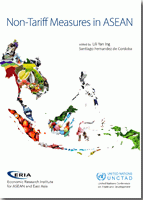
The ability to gain market access opportunities and to benefit from them, increasingly depends on compliance with non-tariff measures (NTMs), such as sanitary and phytosanitary measures and technical regulations. Although many NTMs have primarily non-trade objectives, such as the protection of public health or the environment, they may affect trade and represent a major challenge for exporters, importers and policymakers.
It is therefore important to understand the use of NTMs and their implications for the formulation and implementation of effective development strategies. Comprehensive, systematic and reliable information about NTMs is unfortunately scarce to obtain.
The collection of NTM data is a highly resource-intensive task and requires specific, technical knowledge. In this context, the International Classification of NTMs was developed by several international organizations, the Multi-Agency Support Team (1), in 2006.
The collection, classification and analysis of NTMs as well as the coordination of the global effort to enhance the transparency of NTMs have been a regular activity of UNCTAD. We are aiming to collect data on NTMs covering at least 90 per cent of world trade by the end of 2016.
ASEAN member countries have resolved to work on the elimination of non-tariff barriers. The need to create a standardized, high quality, and comprehensive NTMs dataset of the region called for close cooperation between the Economic Research Institute for ASEAN and East Asia (ERIA) and UNCTAD.
Since December 2014, ERIA and UNCTAD have collaborated to create a comprehensive NTMs database of all ASEAN countries. The database presents official regulations that are currently imposed affecting imported and exported products.
Regulations are classified according to types of measures, affected products at the tariff line level and partner countries. This enables easy and well-structured access to the information. It also allows for case-specific and more systemized analysis and research as well as effective support to policymakers for their efforts in regional and global economic integration.
I am delighted to welcome the publication of this book, which highlights the accomplishments of this cooperation. It will be an asset for government officials, researchers and representatives of the private sector aiming to strengthen their understanding of NTMs, and policy makers involved in the design or negotiation of policies related to NTMs, even beyond the ASEAN region.
Director
Division on International Trade
in Goods and Services, and Commodities
United Nations Conference on Trade and Development
(1) MAST Group is composed of: Food and Agriculture Organization of the United Nations, International Monetary Fund, International Trade Centre, Organization for Economic Cooperation and Development, United Nations Conference on Trade and Development, United Nations Industrial Development Organization, World Bank and World Trade Organization.


